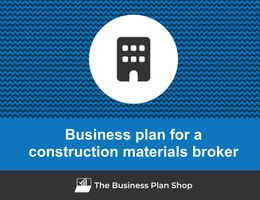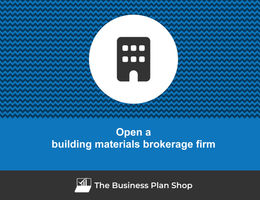How to create a financial forecast for a building materials brokerage firm?
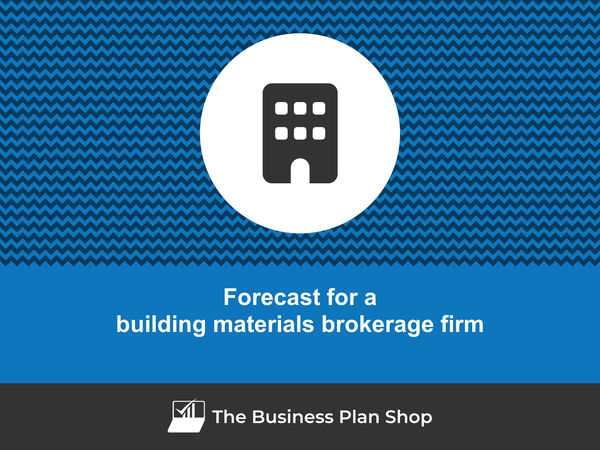
Creating a financial forecast for your building materials brokerage firm, and ensuring it stays up to date, is the only way to maintain visibility on future cash flows.
This might sound complex, but with the right guidance and tools, creating an accurate financial forecast for your building materials brokerage firm is not that hard.
In this guide, we'll cover everything from the main goal of a financial projection, the data you need as input, to the tables that compose it, and the tools that can help you build a forecast efficiently.
Without further ado, let us begin!
Why create and maintain a financial forecast for a building materials brokerage firm?
The financial projections for your building materials brokerage firm act as a financial blueprint to guide its growth with confidence and ensure its long-term financial viability.
To create them, you will need to look at your business in detail - from sales to operating costs and investments - to assess how much profit it can generate in the years to come and what will be the associated cash flows.
During challenging market conditions, maintaining an up-to-date financial forecast enables early detection of potential financial shortfalls, allowing for timely adjustments or securing financing before facing a cash crisis.
Your building materials brokerage firm's financial forecast will also prove invaluable when seeking financing. Banks and investors will undoubtedly request a thorough examination of your financial figures, making precision and presentation essential.
Need a convincing business plan?
The Business Plan Shop makes it easy to create a financial forecast to assess the potential profitability of your projects, and write a business plan that’ll wow investors.

What information is used as input to build a building materials brokerage firm financial forecast?
A building materials brokerage firm's financial forecast is only as good as the inputs used to build it.
If you are creating (or updating) the forecast of an existing building materials brokerage firm, then you mostly need your accounting information, key historical operating non-financial data, and your team’s input on what to expect for the coming years.
If you are building financial projections for a building materials brokerage firm startup, you will need to have done your research and have a clear picture of your competitive environment and go-to-market strategy so that you can forecast sales accurately.
For a new venture, you will also need a precise list of the resources needed to keep the building materials brokerage firm running on a day-to-day basis and a list of the equipment and expenditures required to start the business (more on that later).
Let's now take a closer look at the elements that make up your building materials brokerage firm's financial forecast.
The sales forecast for a building materials brokerage firm
From experience, it is usually best to start creating your building materials brokerage firm financial forecast by your sales forecast.
To create an accurate sales forecast for your building materials brokerage firm, you will have to rely on the data collected in your market research, or if you're running an existing building materials brokerage firm, the historical data of the business, to estimate two key variables:
- The average price
- The number of monthly transactions
To get there, you will need to consider the following factors:
- Increased demand for sustainable building materials can lead to higher prices for these materials, resulting in an increase in your average price per transaction.
- A shortage of skilled labor in the construction industry may result in longer project timelines and delays, leading to a decrease in the number of monthly transactions.
- Changes in building codes and regulations can require contractors to use specific materials, potentially increasing your average price per transaction.
- Economic downturns may result in a decrease in construction projects, leading to a decrease in the number of monthly transactions.
- Increased competition from other building materials brokers can drive prices down as companies compete for customers, resulting in a decrease in your average price per transaction.
Once you have an idea of what your future sales will look like, it will be time to work on your overhead budget. Let’s see what this entails.
Need a convincing business plan?
The Business Plan Shop makes it easy to create a financial forecast to assess the potential profitability of your projects, and write a business plan that’ll wow investors.

The operating expenses for a building materials brokerage firm
Once you know what level of sales you can expect, you can start budgeting the expenses required to operate your building materials brokerage firm on a daily basis.
Expenses normally vary based on how much revenue you anticipate (which is why, from experience, it is always better to start your forecast with the topline projection), and where your business is based.
Operating expenses for a building materials brokerage firm will include some of the following items:
- Staff Costs: This includes the salaries and benefits of your employees, such as brokers, administrative staff, and warehouse workers.
- Accountancy Fees: You will need to hire an accountant to manage your financial records and taxes.
- Insurance Costs: It is important to have insurance coverage for your business, including general liability, property, and worker's compensation insurance.
- Software Licenses: As a brokerage firm, you will need to invest in software to manage your inventory, sales, and other business operations.
- Banking Fees: This includes fees for maintaining a business bank account, wire transfers, and credit card processing fees.
- Marketing Expenses: You will need to promote your business through various marketing channels, such as advertising, website development, and social media marketing.
- Office Rent: If you have a physical office space, you will need to budget for rent, utilities, and other office expenses.
- Communication Expenses: This includes phone and internet services for your business, as well as any necessary equipment and maintenance costs.
- Travel Expenses: As a brokerage firm, you may need to travel to meet with clients or attend industry events, so budget for transportation, lodging, and meals.
- Professional Memberships: You may need to join professional organizations or associations related to the building materials industry, which may have membership fees.
- Legal Fees: It is important to have a lawyer to review contracts and provide legal advice for your business.
- Office Supplies: This includes necessary items like paper, pens, and printer ink, as well as any other office supplies needed to run your business.
- Training and Development: You may need to invest in training programs or workshops to keep your employees up-to-date on industry trends and best practices.
- Inventory Storage: If you have a warehouse to store your building materials, consider the costs of rent, utilities, and maintenance for the storage space.
- Transportation Expenses: This includes the cost of transporting building materials from suppliers to your warehouse or directly to clients.
This list will need to be tailored to the specificities of your building materials brokerage firm, but should offer a good starting point for your budget.
What investments are needed to start or grow a building materials brokerage firm?
Creating and expanding a building materials brokerage firm also requires investments which you need to factor into your financial forecast.
Capital expenditures and initial working capital items for a building materials brokerage firm could include elements such as:
- Office Space: Your building materials brokerage firm will need a physical location to conduct business. This could include purchasing or leasing office space, as well as any necessary renovations or improvements.
- Equipment and Technology: In order to efficiently run your brokerage firm, you will need to invest in equipment and technology. This could include computers, printers, software, and other necessary tools for daily operations.
- Transportation: As a building materials brokerage firm, you will need to transport materials to and from your clients. This may require purchasing or leasing vehicles such as trucks or vans.
- Furniture and Fixtures: In addition to office space, you will also need furniture and fixtures to create a professional and functional workspace. This could include desks, chairs, filing cabinets, and other necessary items.
- Inventory: As a brokerage firm, you will need to have a supply of building materials on hand in order to fulfill client orders. This could include purchasing inventory from suppliers or holding onto excess materials for future orders.
Again, this list is not exhaustive and will need to be adjusted according to the circumstances of your building materials brokerage firm.
Need a convincing business plan?
The Business Plan Shop makes it easy to create a financial forecast to assess the potential profitability of your projects, and write a business plan that’ll wow investors.

The financing plan of your building materials brokerage firm
The next step in the creation of your financial forecast for your building materials brokerage firm is to think about how you might finance your business.
You will have to assess how much capital will come from shareholders (equity) and how much can be secured through banks.
Bank loans will have to be modelled so that you can separate the interest expenses from the repayments of principal, and include all this data in your forecast.
Issuing share capital and obtaining a bank loan are two of the most common ways that entrepreneurs finance their businesses.
What tables compose the financial plan for a building materials brokerage firm?
Now let's have a look at the main output tables of your building materials brokerage firm's financial forecast.
The projected profit & loss statement
The projected profit & loss shows how profitable your building materials brokerage firm is likely to be in the years to come.
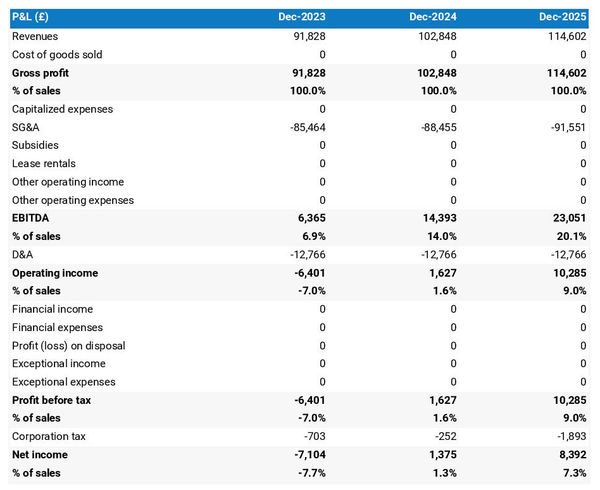
For your building materials brokerage firm to be financially viable, your projected P&L should ideally show:
- Sales growing above inflation (the higher the better)
- Profit margins which are stable or expanding (the higher the better)
- A net profit at the end of each financial year (the higher the better)
This is for established building materials brokerage firms, there is some leniency for startups which will have numbers that will look a bit different than existing businesses.
The projected balance sheet
Your building materials brokerage firm's projected balance sheet provides a snapshot of your business’s financial position at year-end.
It is composed of three types of elements: assets, liabilities and equity:
- Assets: represent what the business possesses including cash, equipment, and accounts receivable (money owed by clients).
- Liabilities: represent funds advanced to the business by lenders and other creditors. They include accounts payable (money owed to suppliers), taxes payable and loans from banks and financial institutions.
- Equity: is the combination of what has been invested by the business owners and the cumulative profits and losses generated by the business to date (which are called retained earnings). Equity is a proxy for the value of the owner's stake in the business.
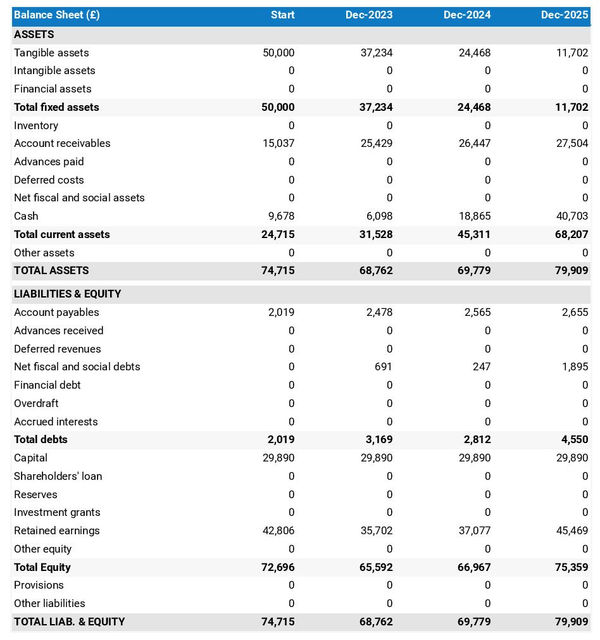
The cash flow forecast
Your building materials brokerage firm's cash flow forecast shows how much cash your business is expected to consume or generate in the years to come.
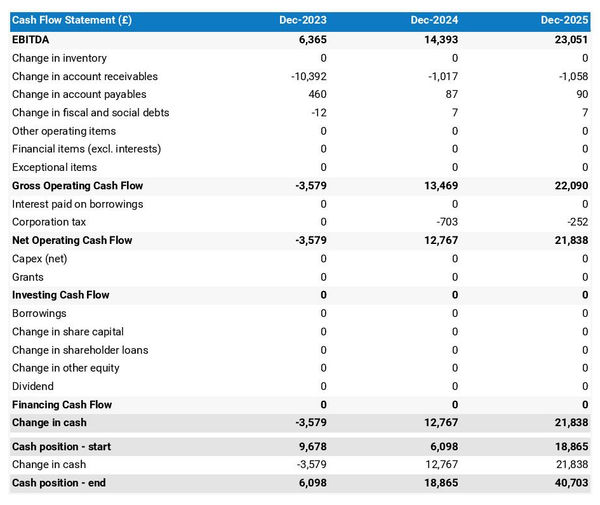
It is best practice to organise the cash flow forecast by nature to better explain where cash is used or generated by the building materials brokerage firm:
- Operating cash flow: shows how much cash is generated by the operating activities
- Investing cash flow: shows how much will be invested in capital expenditure to maintain or expand the business
- Financing cash flow: shows if the business is raising new capital or repaying financiers (debt repayment, dividends)
Keeping an eye on (and regularly updating) your building materials brokerage firm's cash flow forecast is key to ensuring that your business has sufficient liquidity to operate normally and to detect financing requirements as early as possible.
If you are trying to raise capital, you will normally be asked to provide a monthly cash flow forecast in your building materials brokerage firm's financial plan - so that banks or investors can assess seasonal variation and ensure your business is appropriately capitalised.
Need a convincing business plan?
The Business Plan Shop makes it easy to create a financial forecast to assess the potential profitability of your projects, and write a business plan that’ll wow investors.

Which tool should you use to create your building materials brokerage firm's financial forecast?
Creating your building materials brokerage firm's financial forecast may sound fairly daunting, but the good news is that there are several ways to go about it.
Using online financial projection software to build your building materials brokerage firm's forecast
The modern and easiest way to build a forecast is to use professional financial projection software such as the one we offer at The Business Plan Shop.
There are several advantages to using specialised software:
- You can easily create your financial forecast by letting the software take care of the financial calculations for you without errors
- You have access to complete financial forecast templates
- You get a complete financial forecast ready to be sent to your bank or investors
- You can easily track your actual financial performance against your financial forecast, and recalibrate your forecast as the year goes by
- You can create scenarios to stress test your forecast's main assumptions
- You can easily update your forecast as time goes by to maintain visibility on future cash flows
- You have a friendly support team on standby to assist you when you are stuck
- It’s cost-efficient and much cheaper than using an accountant or consultant (see below)
If you are interested in this type of solution, you can try our forecasting software for free by signing up here.
Hiring a financial consultant or chartered accountant
Hiring a consultant or chartered accountant is also an efficient way to get a professional building materials brokerage firm financial projection.
As you can imagine, this solution is much more expensive than using software. From experience, the creation of a simple financial forecast over three years (including a balance sheet, income statement, and cash flow statement) is likely to start around £700 or $1,000 excluding taxes.
The indicative estimate above, is for a small business, and a forecast done as a one-off. Using a financial consultant or accountant to track your actuals vs. forecast and to keep your financial forecast up to date on a monthly or quarterly basis will naturally cost a lot more.
If you choose this solution, make sure your service provider has first-hand experience in your industry, so that they may challenge your assumptions and offer insights (as opposed to just taking your figures at face value to create the forecast’s financial statements).
Why not use a spreadsheet such as Excel or Google Sheets to build your building materials brokerage firm's financial forecast?
Creating an accurate and error-free building materials brokerage firm financial forecast with a spreadsheet is very technical and requires a deep knowledge of accounting and an understanding of financial modelling.
Very few business owners are financially savvy enough to be able to build a forecast themselves on Excel without making mistakes.
Lenders and investors know this, which is why forecasts created on Excel by the business owner are often frowned upon.
Having numbers one can trust is key when it comes to financial forecasting and to that end using software is much safer.
Using financial forecasting software is also faster than using a spreadsheet, and, with the rise of artificial intelligence, software is also becoming smarter at helping us analyse the numbers to make smarter decisions.
Finally, like everything with spreadsheets, tracking actuals vs. forecasts and keeping your projections up to date as the year progresses is manual, tedious, and error-prone. Whereas financial projection software like The Business Plan Shop is built for this.
Need a convincing business plan?
The Business Plan Shop makes it easy to create a financial forecast to assess the potential profitability of your projects, and write a business plan that’ll wow investors.

Use our financial projection templates for inspiration
The Business Plan Shop has dozens of financial forecasting templates available.
Our examples contain both the financial forecast, and a written business plan which presents, in detail, the company, the team, the strategy, and the medium-term objectives.
Whether you are just starting out or already have your own building materials brokerage firm, looking at our template is always a good way to get ideas on how to model financial items and what to write when creating a business plan to secure funding.
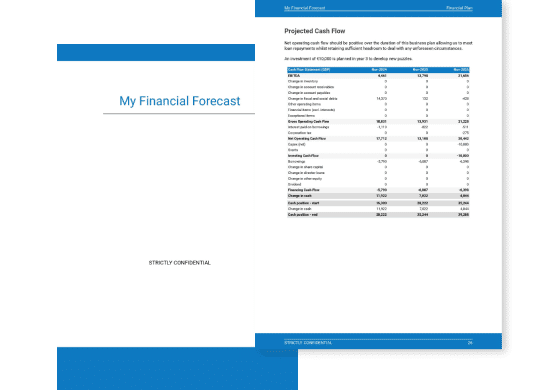
Takeaways
- A financial projection shows expected growth, profitability, and cash generation for your business over the next three to five years.
- Tracking actuals vs. forecast and keeping your financial forecast up-to-date is the only way to maintain visibility on future cash flows.
- Using financial forecasting software makes it easy to create and maintain up-to-date projections for your building materials brokerage firm.
You have reached the end of our guide. We hope you now have a better understanding of how to create a financial forecast for a building materials brokerage firm. Don't hesitate to contact our team if you have any questions or want to share your experience building forecasts!
Need a convincing business plan?
The Business Plan Shop makes it easy to create a financial forecast to assess the potential profitability of your projects, and write a business plan that’ll wow investors.

Also on The Business Plan Shop
- Example of financial projections
- How to create a sales forecast for a business?
- Example of financial forecast for business idea
Know someone who runs or wants to start a building materials brokerage firm? Share our financial projection guide with them!


